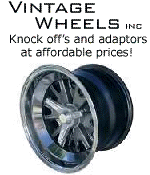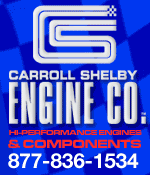 
 Main Menu
Main Menu
|
 Nevada Classics
Nevada Classics
|
 Advertise at CC
Advertise at CC
|
 November 2025
November 2025
|
| S |
M |
T |
W |
T |
F |
S |
| |
|
|
|
|
|
1 |
| 2 |
3 |
4 |
5 |
6 |
7 |
8 |
| 9 |
10 |
11 |
12 |
13 |
14 |
15 |
| 16 |
17 |
18 |
19 |
20 |
21 |
22 |
| 23 |
24 |
25 |
26 |
27 |
28 |
29 |
| 30 |
|
|
|
|
|
|
|
 CC Advertisers
CC Advertisers
|
|

10-26-2002, 03:39 PM
|
|
CC Member

|
|
|
Join Date: Oct 2001
Location: Houston,
Posts: 74
|
|

 Not Ranked
Not Ranked

A Snake: Thanks for looking, I don't have any mixer for that case of oil, so I am glad I don't have to drink any. SJ is the API classification for the GF-2 oils that were the standard until about 6-9 months ago. SL is the newest API designation for the GF-3 spec that was commercialized to replace the GF-2 oil. If you want the differences, let me know.
Bob: What a breath of fresh air, all of that carbon from all of those non-detergents stuck in the cross hatching was about to get to me. It is frustrating when you attempt to present facts, but if we all knew everything what would there be to talk about. I would like to make a comment about your statement on synthetics. Mobil 1 is a PAO, or as you know an SHC(synthesized hydrocarbon) built from ethylene gas. It is really not a synthetic since it is made from a hydrocarbon. Your statement that the proponderance of synthetics are synthesized is correct if you are just talking about the PAO products, but a true synthetic is not synthetized from a hydrocarbon molecule, they are constructed from acids, alcohols, and other chemicals. Di-esters, polyol esters, polyalkylene glycols, silicones, and others have no HC in them. Just a minor point, and I am not trying to one up you, your answers are right on, but to some, we are voices crying in the wilderness.
Cobrashoch: Viscosity has everything to do with it. If your explaination about oil getting into the crosshatch pattern and burning, leaving the carbon to temper the the cylinder walls, the the lower the viscosity, the better that would work. However, that discussion belongs with the old wives tales that you don't like about slippery synthetics. Are you trying to say that the carbon left by the burning of the oil alters the metallurgy of the cylinders? I know I am just a young man, 58, but in all of my days in lubrication, in all my time spect with ASLE, STLE, SAE, and other technical societies, I have never heard of anything like this. Will wonders never cease?? Bob's discussion on the 25,000 mile drain interval was correct, but additionally, the heat to back off came from the auto companies, the oil will perform to those intervals, but who was going to accept the liability. The new zinc reductions are a result of ILSAC and catalyst fouling and do not come from the oil companies as I have said before. In fact, the oil companies are fighting them because of the backward compatibility problem that I have mentioned before and finding something to replace it as an AW and Anti-oxididant. The oil companies do not set the oil change intervals, the auto companies do, and 3,000 miles is crazy and is being upped because of the current oils' capabilities. Bob was right about your comments about 2-cycle oils. And he was right about moly, you just can't keep it in suspension in an engine oil. The oil companies tried that in the 60's and Arco had graphite in the 80's or early 90's, failed badly(marketing). One thing, it made the oil black, and no one wanted to put black oil in their engine.
One size definitely does not fit all, but I can't think of a single reason not to use a PAO(Mobil1) over a mineral oil except for a high consumption engine or leaking engine. Oh yeah, price, but when we spend the bucks on Cobras, engines, and all of the other stuff that goes on or in our engines and cars, what's $2.50-3.00/qt.
Bob, don't tell BinB what ND oils don't have, he is going to use them... as an additive???
Ok guys, you think I stirred the pot earlier, how about this, Castrol Syntec is not a synthetic, it's not even a synthetized hydrocarbon(PAO), like Mobil 1. Guess what it is and you will get the straight skinny on why they can call it a synthetic when it is not. BinB need not enter this contest without some proof...of..of..of something!

|
-
Advertising


10-26-2002, 04:40 PM
|
|
CC Member

|
|
|
Join Date: Jul 2002
Location: Portland, OR area,
OR
Cobra Make, Engine: Contemporary CCX33868 Sold. Just "playin' the boards now."
Posts: 634
|
|

 Not Ranked
Not Ranked

I'm not sure about this, but I'll throw it out for what ever it is worth.
I've been "playing with metal" for quite a few years. Some professionally and some...just for fun.
It seems to me that with regard to cylinder walls, what likely happens is a combination of two or more things. One, cast iron is relatively porous compared to steel. I learned when welding cast iron that if it was soaked with oil, the oil had to be burned out before welding. To me this means that the irons' porosity allows oil to "soak in". Not at a molecular level...more like a sponge soakes up water.
If this is true, then as the rings seat and both the bore and the ring face get smoother (and seal), then some of the oil deposited is forced into the cast iron either as a burned by-product of combustion or as unburned oil.
Now, all things being equal, (we need a metallurgist here) carbon impregnation or not, sufficient temperatures have not been reached to alter the molecular structure of the iron. Neither has a "chill factor" been involved that I can see. (The chilling process, makes the iron extremely hard and dense.)
If any of this blather is acceptable then, I submit that what IS occurring, is a "filling" process. Iron particles combined with carbon are "glazing" the cylinder bore and providing a more contiguous surface and therefore, better sealing.
Ok....blow me away if I'm off target....  
Al
__________________
"If some is good, more is better.
And too much is just enough."
--Carroll Shelby
|

10-26-2002, 08:41 PM
|
|
CC Member

|
|
|
Join Date: Mar 2001
Location: Indianapolis, Indiana, U.S.A.,
IN
Cobra Make, Engine: Home built, supercharged 544cu/in automatic
Posts: 924
|
|

 Not Ranked
Not Ranked

A Snake - You hit it right the first time, bullseye. Been building early block engines with this in mind for years. One even set a early NHRA national record. It's about reducing clyinder wall friction to generate power. That's all I gonna say, trade secret and all. Again, viscosity has nothing to do with it.
Lubrecon - Read what I'm saying. I too believe in the advantages of Synthetics and use them. But I'm not convinced they are the end all as you obviously do. Beyond leaks and costs why such a hard line to dispute those that think different? Your manhood is not in question here! For example your replys to two other posts about roller cam wear and the post that said something about using break in oils at the factory, and not really coming supplied with Synthitics. Let me explain to you my ideas/replies to those posts.
Roller Cam Wear/vs Synthetics - I don't know, nor have I heard of this problem. I can say that most cam failures are in the break in stage of the engine that makes me think that most times the real problem is installation problems. I can also say that synthetics transfer heat away from rollers and rockers better that mineral based oils and this SHOULD help their long-givity. This could indeed be a real problem though, and warrants attention to users of synthetics w/roller cams esp. during break ins. I don't know.
Break Ins at the factory - Does anyone know what the factorys use for sure on engine break ins? (the big american 3) NOT what is shipped with them? This is more of a refection of the materials used in modern engine construction in my mind. For example I know for a fact that moly liners and rings do not have to be broke in and synthetics could be used on these setups.
Also by manufactures I meant the engine manufacturer in my post above.
My problem is not that you have presented your facts that, by the way I MOSTLY except, it's more the blanket approach that you are trying to get me to buy. It's not so, to my way of thinking. Engineering end alls have been presented to us all. Excepting them at face value is dangerous. History is cluttered with cars for example, that have those new ideas that are not around today. My example and the other two replies do indeed have worth, and must be answered by proponents of the new way, along with other questions. And not just blown off even if you do sincerly believe what you think you do. Sometimes too there is something to those old wifes tales.... I still disagree. Neat thread!
  
cobrashock
Try: http://www.eng-tips.com/gviewthread....id/89/qid/8174
Check out the FAQ's and the links pages. We also need to talk about bypass filters to. cobrashock
__________________
Ron Shockley
Last edited by cobrashoch; 10-26-2002 at 11:08 PM..
|

10-26-2002, 10:59 PM
|
|
CC Member

|
|
|
Join Date: Oct 2001
Location: Houston,
Posts: 74
|
|

 Not Ranked
Not Ranked

Al and Ron: I am not worried about my manhood, whatever that is. Look guys here is what an engine oil does in the engine, cylinders, bearings, camshaft area, everywhere. This not necessarily in the order of importance. First it lubricates, then reduces friction, then it reduces wear, then it cools, then it seals, then it cleans. It is not absorbed into the metal, anywhere. Metals, including cast iron are solids, they don't have pores. What the do have are asperities, the peaks and valleys on the surface of the metal left from machining. Ever heard of surface finish? Its designated by RMS, which means Root Mean Square, it is the roughness or smoothness of the surface. At the microscopic level all metallic surfaces have asperities. What you would ideally want is for all asperities to be separated by a full fluid flim of oil. This is call hydrodynamic lubrication and happens mostly in the bearing areas, main, rod, cam. There is a flooded supply of oil. Some takes place in the ring zone area also, except at the top of the stroke when the piston reverses and goes back down the cylinder. At the top, there is very little, if any oil to lubricate or separate the ring face from the cylinder wall. At this point, the lubrication is called boundary lubrication, and the surface chemistry, as affected by the additive components in the oil, namely antiwear additives, protect the surfaces from excessive wear. The actual oil at this point is secondary. Under boundary lubrication, actual metal welding takes place and wear is minimized by the surface chemistry. The surfaces now have materials on them that shear easily and minimize the welding and tearing that is taking place. Bounday lubrication also occurs in the camshaft area. Thats why when you frictionally modify an oil with solids(PTFE, moly, graphite) or some other chemical such chlorine, you get reduced friction and wear in those areas. You also pick up some HP increase, small of course, but some nonetheless. There may be some oil trapped in the asperities at the top of the stroke, and it would be consumed, but it is not leading to or causing any cylinder glazing that makes a smoother surface and reduces friction. There is a phenomenon in diesels called bore polishing that is a result of the soot in the oil, but that is an unwanted happening and leads to many engine problems, not for this discussion.
Bob, help me out here, I have to go to bed. More tomorrow if needed.
BTW, my name is Jerry Shelby. BinB want proof??

|

10-26-2002, 11:33 PM
|
|
CC Member

|
|
|
Join Date: Mar 2001
Location: Indianapolis, Indiana, U.S.A.,
IN
Cobra Make, Engine: Home built, supercharged 544cu/in automatic
Posts: 924
|
|

 Not Ranked
Not Ranked
Jerry - Asperite honeing is the correct term. The real trick is the direction you hone and the other part is getting oil to the top of the cylinder wall. I'll give you a hint, it has to do with the oil ring carrying oil to the top. And those engines use oil.
Your lecturing the chior here, but in spite of all you have said there is still no proof that synthetics are better than mineral based oils esp. considering the costs. Just a short explnation of what is going on is what I see. Just call me BinB.
  
cobrashock
__________________
Ron Shockley
Last edited by cobrashoch; 10-26-2002 at 11:44 PM..
|

10-27-2002, 01:04 AM
|
|
CC Member

|
|
|
Join Date: Jul 2002
Location: Portland, OR area,
OR
Cobra Make, Engine: Contemporary CCX33868 Sold. Just "playin' the boards now."
Posts: 634
|
|

 Not Ranked
Not Ranked
Jerry,
I'm certain you really know your stuff when it comes to lubrication. I would however like to respectfully submit, that you might want to look into the cast iron porosity matter before making a blanket statement. No, it isn't a sponge as I used in my analogy, but it will and does absorb some types of oil and solvents. I can't tell you what level of saturation occurs with each, but it does occur however minutely. Again, ask any good welder who works with repairing cast iron.
Having done precision machine work, I'm quite familiar with the finish level gauging process and have a set of gauges for the purpose. Where "x" is the value relative to a perfect mirror finish.
Al
__________________
"If some is good, more is better.
And too much is just enough."
--Carroll Shelby
|

10-27-2002, 06:07 AM
|
|
Senior Club Cobra Member

|
|
|
Join Date: Jul 2000
Location: Las Vegas,
NV
Cobra Make, Engine: ERA 427 SO
Posts: 1,126
|
|

 Not Ranked
Not Ranked
Hey, guys, great topic and great debate here! I'm reading these posts with great interest. I'm not a lubrication, chemistry or metallurgy expert, but there's some good info coming out.
Just remember, no flames; this is not an argument, just an excellent debate between friends and gentlemen...keep it coming! I'm getting an edjumacation here!
__________________
Ken
|

10-27-2002, 06:32 AM
|
|
CC Member

|
|
|
Join Date: Jun 2000
Location: Rock Hill,
SC
Cobra Make, Engine: Superformance, 396 CI
Posts: 1,268
|
|

 Not Ranked
Not Ranked

I have been fascinated by engine lubrication since the late '70's, and have used Synthetics in just about every powered device and car since then. I have read the occasional discussioins on oil/oiling in the auto magazines. I no expert nor engineeer, but here are a few posts about oil:
http://www.caranddriver.com/xp/Caran...l?keywords=oil
http://www.caranddriver.com/xp/Caran...l?keywords=oil
http://www.caranddriver.com/xp/Caran...l?keywords=oil
Sorry about the very long links, you will have to type them in, or just go to the Car and Driver webs site, and do a search on oil
http://www.caranddriver.com/xp/Caranddriver/home.xml
These discuss many of the points argued about in the CC oiling posts.
I won't reinterate them. For the "record", about 15 years ago, my neighbor and I bought John Deer lawn tractors, with 12.5 HP Kawasacki motors. Bought the same day, mowed large yards (Kansas!!) , i used synthtic oils after a break in with mineral oil (which i always do), he used the John Deer mineral oil.
After some years, his smoked a bit and used some oil, whereas my identical motor did not use a drop, and did not smoke at all.
Previously, my wife was out mowing on a 8 hp Snapper, and did not notice that cottonwood spring "cotton" had completely been sucked into the engine's cooling fan, so no air was cooling the motor. When she turned it off, running fine, the motor was so hot all the paint had blistered off, and it was sizzling, but it was not siezed, i believe because of the thermal protection of the Synthetic oil in the crankcase.
I broke my SPF's custom stroker in for about 4Kmiles with frequent mineral oil changes, and have run Red Line 10-40 or 20-50 with now over 46,000 hard hard miles on the motor. It does not leak or use oil between changes. Red Lines' race oils are non detertent, by the way. I use the street detergent oils, of course.
My opinion is that all modern oils are superb lubricants, and that synthetics are even better.
I have an extensively modifed external oiling hose/filter/cooler, and run an Ernie Elliot filter adaptor off of one of the Evernham Dodge NASCAR cars, which i got from a used NASCAR parts place up in NC. I run Wix racing oil filters, 23 micron, and have drilled and tapped my oil return line so it flows thru AN 12 straight into the block, bypassing the Canton block adaptor.
I am very proud of my oiling set up, it is very impressive, looks cool with the new Blue Accusump right in front of the engine, up by the huge oil filter. Had the Race Tech mechanic at Goodrich up in Mooresville make up some of my lines, what a pretty thing the Kevlar and Stainless Steel mix is in the engine compartment. I an do SS lines, but Kevlar takes a special swedge machine to assemble.
When i croak, i have it in my last will and testiment that i am to be embalmed with 20-50 Synthetic oil!!
__________________
Hal Copple
Stroked SPF
"Daily Driver"
IV Corps 71-72, Gulf War
|

10-27-2002, 07:06 AM
|
 |
CC Member

|
|
|
Join Date: Jul 2001
Location: Senoia,
Ga.
Cobra Make, Engine: 427SO with big twin autolite inlines on custom intake, jag rear, top loader, wembeldon white, guardsmen blue stripes
Posts: 3,155
|
|

 Not Ranked
Not Ranked
Cobrashoch, I was wondering when someone would mention moly, I use MoS2 in everything I own with the exception of automatic transmissions, and in those, I use the friction modifier
from ford. I believe MoS2 addresses
the longevity issue and of course, added only after break-in.
__________________
Perry
Remember!, there's a huge difference between a 'parts' changer, and a mechanic.
|

10-27-2002, 09:28 AM
|
 |
CC Member

|
|
|
Join Date: Jul 2002
Location: Lawrenceville,,
GA
Cobra Make, Engine: Everett/Morrison- Boss 302 Stroked W/351W heads and a whole bunch of ponies
Posts: 207
|
|

 Not Ranked
Not Ranked
Hal,
Any luck you could post some pictures of your filtering system.
I like to see it and would love to get some ideas from your set up.
It sounds awesome.
Thanks
Hector Collado

__________________
Hector Collado
Everyday is a Holiday ... every meal is a banquet.
|

10-27-2002, 09:48 AM
|
|
CC Member

|
|
|
Join Date: Oct 2001
Location: Houston,
Posts: 74
|
|

 Not Ranked
Not Ranked
Ron...you have got to be kidding...no proof that synthetics are better than mineral oils??? Bob, you want this one or must I bear the burden? I must admit, I am flummoxed by this discusion.
No takers on the Castrol Syntec contest? Come on guys take a chance. Bob, you cannot enter!
|

10-27-2002, 10:49 AM
|
|
CC Member

|
|
|
Join Date: Jun 2000
Location: Rock Hill,
SC
Cobra Make, Engine: Superformance, 396 CI
Posts: 1,268
|
|

 Not Ranked
Not Ranked
Hector, i have tried and failed to post pictures, but if will send me an email to my home address, with your return email address in the note to me, i can send you some digital pictures. I don't know how to do it otherwise.
I like being able to change my oil filter by just leaning over the fender and unscrewing it, i don't have to jack the car or reach up and get hot oil on my arm.
I have some spare AN 12 swedged line hoses made up i did not use, they are off the NASCAR cars, they put new stuff one after every race, i guess.
hal
__________________
Hal Copple
Stroked SPF
"Daily Driver"
IV Corps 71-72, Gulf War
|

10-27-2002, 11:30 AM
|
|
CC Member

|
|
|
Join Date: Jan 2000
Location: Maple Valley,,
Wa
Cobra Make, Engine: Unique 289 FIA gone now
Posts: 199
|
|

 Not Ranked
Not Ranked

Boy, that Jams is sure a trouble maker isn't he? I'm not sure if his original question was ever answered, and I don't have the patience to read through 4 pages to find out. Best answer I've got is, follow the warrantor's advice, they're the ones on the hook. After the warrantee expires, there's plenty to glean in this thread.
Jerry,
Correction on the synthesized HC taken, I was being myopic about crankcase lubes, forgetting entirely about the vast industrial market.
I'm semi-retired and you look to have the energy and knowledge to work it, and you're way more current than I on the latest specs. To me, you da man!  I'm surprised that no one picked up on your last name. You wouldn't happen to have a chicken farm on the side would you? I'm happy to support your technical position, but after a while a pragmatic approach is best for the psyche. My main concern is no overtly harmfull positions gain traction. Besides, I've spent a lot of my energy on the oil pressure discussions.
Ron,
It's been a while since B&S did a two cycle engine. What's your mix ratio when you blend the gasoline and ND oil?
A Snake is a gentleman and a scholar.
Hal,
Good contribution as usual. There is one observation I would have about your comparison with your neighbor and the John Deere tractors. Based on the tone of your posts over time I'm left with the impression you are quite meticulous. Without knowing if your neighbor followed the same maintenance practices as you, a comparison is not entirely accurate. It's like so many discussions on this (or any other for that matter) board, we often miss the apples to apples detail. As an example; there was a recent post about insurance (seen more often than even lube ones!) that relayed one member's positive experience with a replacement company. My being insured with his previous company, I was curious about rates on my fun car at our second home (a '56 Chev, not a Cobra, which may or may not matter). I went to the "new" companie's site and did the self quoting form. Their rate was about the same as my renewal coming up, but the big kicker was amount of coverage. They would only do $100,000.00 liability, rather than the $500,000.00 I want and have. All of a sudden they were WAYYYYY out of the ball park. Had I just focused on rate, I would have missed the point. This is my long winded way of telling all that there are nearly always more points of comparison than sometimes seems apparent. Therein lies the challenge for those taking a broader view communicating with those focused on a specific issue.
Gotta get back to poundin' nails. Later!
__________________
My favorite things turn money into noise.
Luck occurs when preparation and opportunity converge.
|

10-27-2002, 01:01 PM
|
 |
Senior Club Cobra Member

|
|
|
Join Date: Mar 2001
Location: Southern Connecticut,
CT
Cobra Make, Engine: SPF - 351W, 944 non-turbo
Posts: 2,105
|
|

 Not Ranked
Not Ranked

Just a few thoughts -
Race cars use racing oil because it's only going a few hundred miles and all they want is pure lubrication. Tomorrow they'll tear down the engine and clean it up. They use higher viscosity because they're running at 7,000 RPM all day long! Don't base your oil selection on what Rusty Wallace uses.
Both synthetic and mineral oil will adequately lubricate any street engine for many, many, many miles.
You should use the thinest oil possible while maintaining the pressure you need. If 5W-30 gives enough pressure use it, if not use a higher viscosity.
Change the oil and filter regularly, use good quality for both.
Don't install an empty filter, fill it first then install.
Regardless of the mileage change the oil at least once a year. Don't dump the old oil into the woods or a storm sewer!
Be wary of additives. It could be that Castrol, Quaker State, Pennsoil and Mobil already know how to best lubricate your engine.
Avoid high revs 3 seconds after your engine starts. Let the oil move around and warm up.
Don't always believe your engine builder or mechanic. Many of them would still go back to 6 volt electrical systems, vacuum wipers, tube radios, generators, drum brakes, bias tires and inner tubes. I'll bet many of them don't have cable TV or a PC.
Bob

|

10-27-2002, 01:41 PM
|
|
CC Member

|
|
|
Join Date: Oct 2001
Location: Houston,
Posts: 74
|
|

 Not Ranked
Not Ranked
Bob
Well put, a good post. Here is a site with some good info for all of the doubting Thomas'.
http://members.aol.com/c1j1miller/oil.html
BinB check it out.
Jerry |

10-27-2002, 06:22 PM
|
|
CC Member

|
|
|
Join Date: Jun 2000
Location: Rock Hill,
SC
Cobra Make, Engine: Superformance, 396 CI
Posts: 1,268
|
|

 Not Ranked
Not Ranked

hello Bob: for sure, comparing two mowers is not some sort of statistical analysis, more of the "testimonial" variety.
Can't do a meta or Chi square on that one, that is for sure.
But for my gasoline things, i do use synthetics, i am pretty compulsive about my oiling.
I got to thinking about some of the comments about the Briggs and Stratton warning to use non detergent oil when i was out cruisin' in the Great Stroker this afternoon. My hunch is that they know most folks never change their mower oil, and since these small engines don't have filters, they will last longer if the combustion debris and wear particles settle out and just stay down and out of circulation. Just a guess.
I can recall in years past seeing auto engines that ran non detergent oil (i presume), and when the valve covers were pulled, all you could see was a big gooey blob where the valve train should have been. Interesting happenings in oil, the Toyota oiling problems, the earlier issues with excessive viscosity ratings ( the 5-40 and such spreads), the Syntec suit by Mobile One, and on and on.
I seek pefection in my cars, it is a curse. I have also an addiction to continual modification of otherwise complete and fine automobiles. I just put a $80 Canton Mecca full flow oil filter cannister on my wife's new Jeep Liberty.
All the best,
__________________
Hal Copple
Stroked SPF
"Daily Driver"
IV Corps 71-72, Gulf War
|

10-28-2002, 08:57 AM
|
 |
CC Member

|
|
|
Join Date: Mar 2002
Location: so cal,
Cal
Cobra Make, Engine: I used to fix them for a living
Posts: 2,563
|
|

 Not Ranked
Not Ranked
Quote:
Originally posted by Bob In Ct
.
Don't always believe your engine builder or mechanic. Many of them would still go back to 6 volt electrical systems, vacuum wipers, tube radios, generators, drum brakes, bias tires and inner tubes. I'll bet many of them don't have cable TV or a PC.
Bob
|
\
If you really think that way, you certainly shouldn't pay those people to machine, build or repair any of your equipment. I always loved it when customers would come into my shop to have me do work on their motor, then tell me how to do it. If you know more than your mechanic, why are you paying him to do something that you can do better? |

10-28-2002, 09:53 AM
|
 |
CC Member

|
|
|
Join Date: Dec 2001
Location: Olympia/Lacey,
WA
Cobra Make, Engine: West Coast. 514 / 6 speed Richmond overdrive
Posts: 1,981
|
|

 Not Ranked
Not Ranked
 Read the article(s)...
Read the article(s)...
Still no proof offered that I should use synthetics for BREAK-IN 
I have been convinced, some time ago of the value of synthetics...in fact I use them in all of my motors AFTER break-in. Read my posts on this thread carefully.
Using Mobil 1 or Royal Purple synthetics right now in one street motorcycle (Yamaha V-Max, went synthetic at 3,000 miles) ..a Saturn, a Ford 460 hi-cube van, (could feel the difference on the first start up on this older motor!!) and my Scout 2 Jeep type 258 straight 6...could feel the difference there also.
AFTER my 514 is broken in with 20/50, as recommended by FORD performance, (maybe @ 2,000 to 2,500 miles) I will be using 10/40 Royal Purple synthetic, since I just discovered they make it. The recommended oil is 20/50 but I live in a cooler climate than most.
Filters will be the K & N
__________________
James Madison, father of the Constitution, said, "If Tyranny and Oppression come to this land, it will be in the guise of fighting a foreign enemy." He also said, "No nation could preserve its freedom in the midst of continual warfare..."
~~~~~~~~~~~~~~~~~~~~~~~~
http://www.standdown.net/index.htm
|

10-28-2002, 10:32 AM
|
|
Senior Club Cobra Member

|
|
|
Join Date: Jul 2002
Cobra Make, Engine:
Posts: 15,712
|
|

 Not Ranked
Not Ranked
Cost vs benefit analysis tells me:
Use a standard good grade of oil and change it often. I'm not into after market "additives" or "synthetic" oils in general. The biggest problem I saw as a mechanic were people who like to CHANGE BRANDS of oil based on what was currently "on sale"!
Whatever you use, STAY WITH IT and CHANGE IT OFTEN! Mixing brands when you change oil or ADD oil in between seems to be about the worst thing you can do. Or maybe thats just an old wives tale?
Ernie
|

10-28-2002, 11:24 AM
|
|
CC Member

|
|
|
Join Date: Oct 2001
Location: Houston,
Posts: 74
|
|

 Not Ranked
Not Ranked
BinB: I thought you said your 514 was already broken in...wasn't it run for 20 minutes??
Ernie: Mixing oils is not necessarily a bad thing as long as you stay within the same API Service Classification. Basically, within the same API Service Classification, most oils have passed the same Sequence tests to get that Classification. It's not something I recommend, but it won't cause any harm either. You are right on though about being an old wives tale...there seems to be a lot of those around where lubrication is concerned.
Now Mr. Fixit, Bob made that statement in the context of lubrication, not in reference to anyone's mechanical ability. Relax, I couldn't bore a cylinder or mill a head, which I am sure you could very easily. We all have different talents and expertise that's all.
Jerry
|
 Posting Rules
Posting Rules
|
You may not post new threads
You may not post replies
You may not post attachments
You may not edit your posts
HTML code is On
|
|
|
All times are GMT -7. The time now is 11:11 PM.
|





















 Linear Mode
Linear Mode



